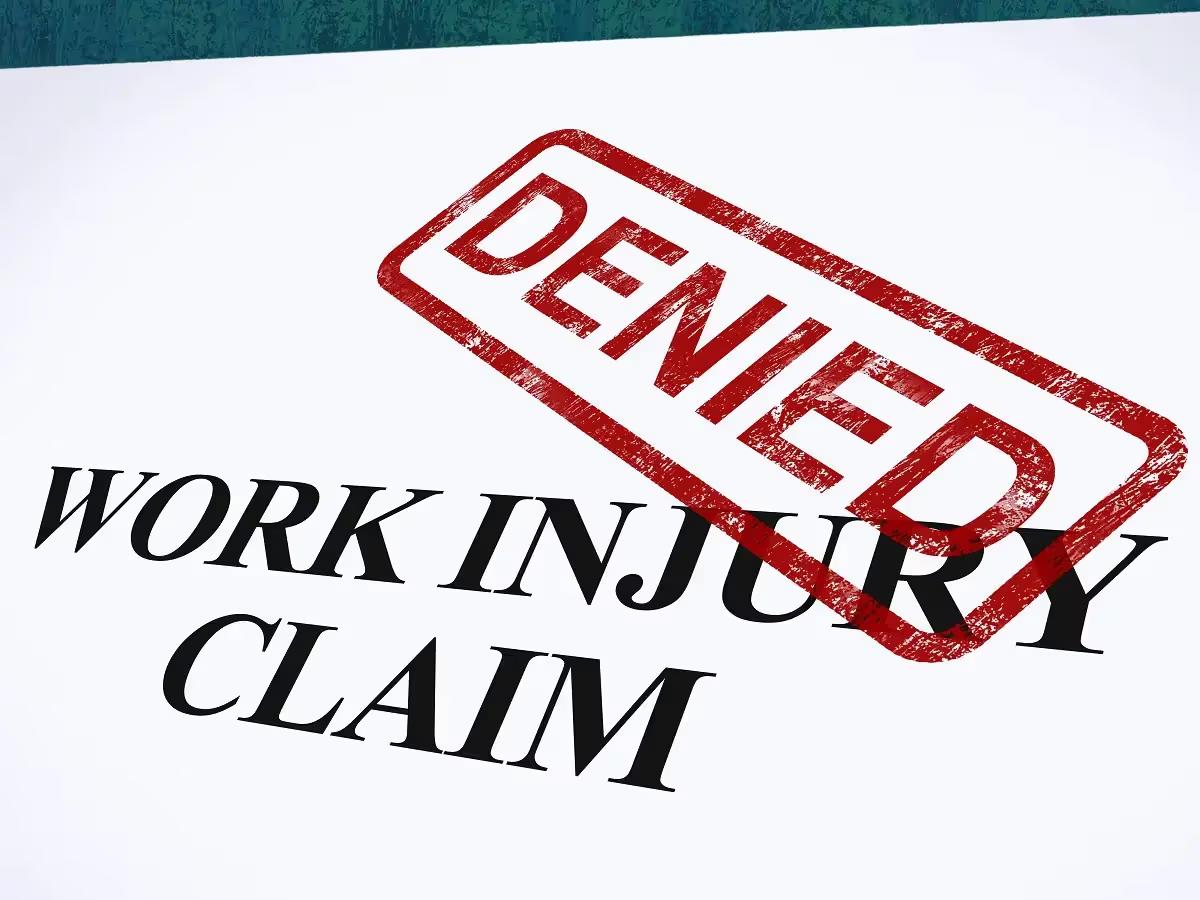There is no fee unless we win!
EN

- EN
- ES


Workers’ compensation is a vital safety net for injured workers in Washington. It provides essential benefits to those who suffer work-related injuries or an occupational disease.
These benefits include coverage for:
But what happens if your employer protests your claim or it is denied? Unfortunately, many injured workers in Washington face this reality, leaving them confused, frustrated, and burdened with mounting bills.
It’s important to remember that a workers’ comp denial isn’t necessarily the end of the road. The workers' compensation attorneys at Lehmbecker Law are here to guide you through the steps to take if your workers' comp claim is denied in Washington.
While the exact number of denied claims varies, research estimates that around 7% are rejected annually. Based on the 2.6 million injury and illness cases reported by employers in 2023, this could mean nearly 182,000 individuals faced the initial challenge of a denied claim.
Why are so many claims denied? The reasons can vary, but one surprising factor stands out: incorrect information. A retrospective study from the early 2000s revealed that a staggering 78.8% of denied claims involved errors in medical reports.
That doesn't mean the fight for compensation ends there. Initial denials are far from the last word. In fact, approximately 47% of respondents to a recent survey who ultimately received benefits reported having their claims initially rejected.
So, what can you do if your claim gets denied? Seeking legal guidance can be a game-changer.
Studies show that workers with legal representation typically achieve better outcomes and receive more compensation than those who navigate the process alone.

The justifications for denial can be diverse and potentially complex, but the following reasons are all common:

Facing a denied workers' comp claim can be frustrating and confusing. Keep in mind, however, that there are still steps you can take to seek compensation. Here's a breakdown of your options.
Start by carefully reviewing the rejection letter from the Washington State Department of Labor & Industries (L&I). It should explain the specific reasons your claim has been denied. This insight will be crucial for choosing your next steps.
You can take one of two courses if you believe your denial is unwarranted.
With this approach, you’ll register your concerns with your claims manager at L&I. You’ll need to gather any additional evidence that may strengthen your case and submit it with your protest within 60 days of receiving the denial.
This is a formal legal process requiring more careful preparation. You'll file a written appeal to the BIIA outlining why you disagree with the denial and providing supporting evidence.
The deadline for this option is 60 calendar days from the denial date (15 for decisions regarding vocational benefits). If the board doesn’t receive your written protest in that time, the decision will stand.
Lastly, consider consulting a qualified workers' compensation attorney. Their advocacy can significantly increase your chances of success.
Among other things, your lawyer can:
Don't give up if your application for workers’ compensation benefits has been turned down. With reliable legal support, you can still secure the compensation you need.
Here’s how to proceed if you decide to protest your denial with L&I.
You’ll find the name of your claim manager on any official L&I correspondence you’ve received. This person will be your first point of contact for challenging the decision.
Compose a concise yet cogent letter outlining why you disagree with the denial.
Make sure to include:
Keep in mind that you have only 60 calendar days from the denial date to file your protest. Don't miss this crucial deadline!
If L&I closed your claim completely, your protest should include your current medical information. Explain and verify your condition and treatment plan through written updates from your doctor or healthcare provider. Include a prognosis if available. Don't forget to include your name and L&I claim number on every page of your protest.

To submit your protest online, you can upload it through the My L&I hub of the Department of Labor and Industries website.
If you’d prefer to mail it, send your printed protest to the following address:
Claims Section
Department of Labor & Industries
P.O. Box 44291
Olympia, WA 98504-4291
L&I will review your protest and issue a new decision that affirms, modifies, or reverses the original denial. If your protest is successful, your employer's insurance company will become responsible for all medical expenses related to your injury. Otherwise, you can proceed to appeal the decision to BIIA.
No. Workers' compensation is typically an exclusive remedy, meaning it's the primary way to address work-related injuries, including denied claims. You usually can't sue your employer directly for a workplace injury covered by workers' comp, even if the claim is denied. However, you can appeal the denial through the workers' compensation system's established process. You can also file a personal injury lawsuit against a third party if their negligence caused your work injury.

Washington offers injured workers an avenue to push back against unfairly denied workers’ comp claims: appealing to the Board of Industrial Insurance Appeals (BIIA).
Time is of the essence with this option, as there are strict deadlines for filing a workers' compensation appeal. More specifically, you’ll have 60 days to address claim and payment decisions and only 20 days for medical provider billing decisions.
To ensure that your appeal receives due consideration, make it a point to include the following:
If your appeal doesn’t include each of these elements in its proper place, it may be rejected, resulting in BIIA affirming the original decision.
You can submit your appeal electronically through the BIIA website.
Alternatively, you can mail a printed appeal to the following address:
Board of Industrial Insurance Appeals
PO Box 42401
Olympia, WA 98504-2401
Another option is to visit the BIIA office in Olympia to deliver your appeal in person.
Note: While you can file an initial protest with L&I, you can also appeal directly to the BIIA without this step. The BIIA will notify L&I and give them a chance to reconsider their decision. If they affirm it, your appeal will proceed to a hearing.

When your workers' compensation claim is denied in Washington State, the burden of your medical bills falls on you. This can be incredibly stressful, especially after you’ve sustained a work-related injury. The good news is that help might be available in other forms.
If you have a personal health insurance policy, it might cover some or all of your bills, depending on your specific plan, deductibles, and copays.
You might also qualify for assistance from Washington State’s Basic Health Plan or Apple Health (Medicaid) based on your income and the size of your family.
Another option is to attempt to negotiate reduced rates or payment plans directly with medical providers, especially for future treatment. It will help to emphasize the financial hardship you’re facing due to the claim denial.
Regardless of the course you take, it’s imperative to document everything. Keep detailed records of all medical bills and communication with L&I, your employer, and various healthcare providers. These documents will be critical for future appeals or legal actions.
You must also adhere to all applicable deadlines, as missing them can permanently waive your rights to pursue these options.

Initiating a workers' comp claim can be complicated, and appealing a denial adds another layer of uncertainty. While consulting a lawyer is always helpful, there are specific situations where their guidance becomes crucial.
How to win a workers’ comp appeal? Consider seeking legal support if:
An attorney can empower you throughout the appeals process, offering valuable guidance and advocating for your rights.
An unfavorable L&I decision can feel like a heavy blow. Fortunately, you don't have to face this challenging time alone. Lehmbecker Law's Washington workers' comp attorneys are here to guide you through the appeals process and pursue the compensation you need. Contact us for a free consultation.

An L&I denial doesn't mean it's over. Our experienced attorneys know how to get you back in the fight for rightful compensation. Schedule a free consultation today!